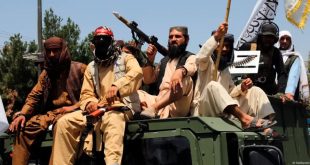Afrasiab Khattak
After the extremely deep involvement of the Pakistani state in Afghan “Jihad” in 1980s (subsequently recognized to be the largest covert US anti communist operation) and after becoming a hub for international “Jihadist” project attracting every known “Jihadist” entity to its soil from around the globe, many people thought that it is impossible for Pakistan to grow out of this quagmire any time soon. The problem was not confined to just using militant outfits as “assets and instruments” of foreign policy in countries like Afghanistan and India. Uighur separatists from Xinjiang China who initially operated from Taliban’s Afghanistan shifted to Pakistan after 9/11 and worked from here against China, the best friend of the country. Iran faced similar problem from our soil as Jandullah and some lesser-known outfits launched regular attacks in the border areas of that country. In 1990s there would be hardly any terrorist attack anywhere in the world that could not be traced back to Pakistan. This was obviously poisonous for the country’s international image and resulted in its large-scale isolation.
After 9/11 when all eyes turned towards Pakistan as supporter of the Afghan Taliban who had given shelter to OBL, General Musharraf’s government did take some action against terrorist outfits but it also proved to be haphazard and without a clear long term strategy, the rhetoric about “enlightened moderation” not withstanding. Particularly his U turn on Afghanistan proved to be a double U turn as Taliban who retreated from Afghanistan were allowed to regroup here and launch yet another war in Afghanistan from Pakistani soil. Military operation in FATA was more aimed at containing the Taliban than fully eliminating them. Even those operations were dubbed as US inspired by pro Taliban political parties not without the tacit support of the establishment. Al-Qaida had to be around as “trainer, financier and supporter” of Taliban. Hence the presence of OBL in Abbotabad. The rest is history.
After the launching of the long delayed Operation Zarb-e-Azb against terrorist sanctuaries in June 2014 and approval of National Action Plan (NAP) in December 2014 it appeared that finally Pakistan has decided to go through a paradigm shift in it’s war against terror. All political parties and state institutions publicly declared that it is our own war and no distinction will be made among good and bad Taliban while fighting against them. It was clearly hinted in the end of 2014 that the country’s Afghan policy, which is, now overtly and formally handled by the country’s military is changing in favor of establishing friendly and peaceful relations with Afghans. After all the fight was about the presence of foreign troops in Afghanistan and now when they were leaving there is no justification of war. Military operation in Waziristan did target bases and training camps of Afghan Taliban but their leadership, in some cases relocated, remains firmly based in Pakistan.
Although Afghanistan faced a winter of fierce fighting in 2014 but she was given to understand that it is only temporary and that Pakistan will broker peace between Taliban and Afghan government in the spring of 2015. Moreover the blueprint of a coordinated war on terror by the armies of Pakistan And Afghanistan on both sides of the Durand Line was also discussed to defeat terrorists. It is not that these promises did not materialize but Afghanistan also saw the summer offensive by Pak based Taliban that has been the fiercest in so many decades.
And then comes the fall of Kunduz to Taliban fighters. There was no Pak official condemnation of the death and destruction inflicted on the citizens of Kunduz for almost twenty-fourhours. It means terrorism in Pakistan will be fought but if the attack is in Afghanistan, Pakistan remains “neutral”. Taliban are RAW agents in Pakistan but “freedom fighters” in Afghanistan. The double standards have gone too far. The way most of the Pak media and pro Taliban political circles started gloating over the reports from Kunduz the first evening shows that there is almost no change in the country’s Afghan policy. Afghan Taliban had been promising over the years that they will part with Al-Qaida and other foreign terrorists when they go back to their country. But they have taken hordes of Chechens,Uzbeks, Arabs, Uighur and a good number of Pakistani fighters with them into Afghanistan for the current offensive. How has Pakistani state reacted to this breach of promise by Taliban? Like always it has turned a blind eye to it. But how can Pakistan remain indifferent to the shifting of transnational terror syndicate to Afghanistan once again. Apart from destroying peace in Afghanistan the presence of this multinational group of terrorists threaten the countries of Central Asia. Is this the way that we want to have an entry into Central Asia? Last but not the least we should be concerned about the Taliban’s designs in Badakhshan. They are trying to capture parts of that northeastern Afghan province that borders at the restive Chinese Autonomous Region of Xinjiang. How would our great friend react to become a neighbor to a militant group that has a history of having links with the separatists of the so-called Islamic Movement of Turkistan? The penetration of such elements into Wakhan Corridor creates security threats for the CPEC.
Pakistan’s tacit support for Afghan Taliban has not only buried NAP in Pakistan but has also put the National Unity Government in Afghanistan in general and President Ashraf Ghani in particular in a very awkward position. The only way out after events in Kunduz is a drastic rethink of Pakistan’s Afghan policy and taking bold decisions. After such military “victories” of Afghan Taliban in their own country Pakistan can’t afford any more their presence in Pakistan. How can we allow existence of Afghan Taliban’s Shuras (who claim to be parallel governments) in Pakistan? They should go back to their own country. That can revive Pakistan’s position as a neutral facilitator in the intra Afghan dialogue that should not be hostage to the whims of any side and should have a clear time line. Pakistan can make similar demands from Afghanistan on TTP sanctuaries in that country. Distancing itself from the discredited brand Taliban fighters Pakistan’s case for demanding action against TTP shall get stronger. If we don’t come clean on Taliban, Afghans will be justified in claiming that Pakistan is still following the policy of strategic depth towards Afghanistan and its ultimate aim remains to install a puppet government in Kabul.
 Afghanistan Times
Afghanistan Times




